ETRUSCAN SEX LIFE
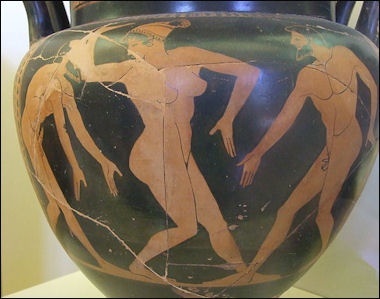
dancing naked Etruscan woman
The Etruscans dominated Italy in the 8th through 5th century B.C. before Rome became a major power. The 4th century B.C. Greek historian Theopompus of Chios, wrote a description of the behavior of Etruscan women. References to this behavior occur also in Plato's ideal State (no. 73) and in Xenophon's description of Sparta (no. 97). Scholars say the account is believed to be inaccurate and the least exaggerated, offering more insight fourth-century Greek attitudes than those of the Etruscans. [Source: Diotima]
Theopompus wrote in “Histories” 115: Sharing wives is an established Etruscan custom. Etruscan women take particular care of their bodies and exercise often, sometimes along with the men, and sometimes by themselves. It is not a disgrace for them to be seen naked. They do not share their couches with their husbands but with the other men who happen to be present, and they propose toasts to anyone they choose. They are expert drinkers and very attractive.
“The Etruscans raise all the children that are born, without knowing who their fathers are. The children live the way their parents live, often attending drinking parties and having sexual relations with all the women. It is no disgrace for them to do anything in the open, or to be seen having it done to them, for they consider it a native custom. So far from thinking it disgraceful, they say when someone ask to see the master of the house, and he is making love, that he is doing so-and-so, calling the indecent action by its name.
“When they are having sexual relations either with courtesans or within their family, they do as follows: after they have stopped drinking and are about to go to bed, while the lamps are still lit, servants bring in courtesans, or boys, or sometimes even their wives. And when they have enjoyed these they bring in boys, and make love to them. They sometimes make love and have intercourse while people are watching them, but most of the time they put screens woven of sticks around the beds, and throw cloths on top of them.
“They are keen on making love to women, but they particularly enjoy boys and youths. The youths in Etruria are very good-looking, because they live in luxury and keep their bodies smooth. In fact all the barbarians in the West use pitch to pull out and shave off the hair on their bodies.
Categories with related articles in this website: Early Ancient Roman History (34 articles) factsanddetails.com; Later Ancient Roman History (33 articles) factsanddetails.com; Ancient Roman Life (39 articles) factsanddetails.com; Ancient Greek and Roman Religion and Myths (35 articles) factsanddetails.com; Ancient Roman Art and Culture (33 articles) factsanddetails.com; Ancient Roman Government, Military, Infrastructure and Economics (42 articles) factsanddetails.com; Ancient Greek and Roman Philosophy and Science (33 articles) factsanddetails.com; Ancient Persian, Arabian, Phoenician and Near East Cultures (26 articles) factsanddetails.com
Websites on Ancient Rome: Internet Ancient History Sourcebook: Rome sourcebooks.fordham.edu ; Internet Ancient History Sourcebook: Late Antiquity sourcebooks.fordham.edu ; Forum Romanum forumromanum.org ;
“Outlines of Roman History” forumromanum.org; “The Private Life of the Romans” forumromanum.org|; BBC Ancient Rome bbc.co.uk/history; Perseus Project - Tufts University; perseus.tufts.edu ; Lacus Curtius penelope.uchicago.edu;
Gutenberg.org gutenberg.org
The Roman Empire in the 1st Century pbs.org/empires/romans;
The Internet Classics Archive classics.mit.edu ;
Bryn Mawr Classical Review bmcr.brynmawr.edu;
De Imperatoribus Romanis: An Online Encyclopedia of Roman Emperors roman-emperors.org;
British Museum ancientgreece.co.uk; Oxford Classical Art Research Center: The Beazley Archive beazley.ox.ac.uk ;
Metropolitan Museum of Art metmuseum.org/about-the-met/curatorial-departments/greek-and-roman-art;
The Internet Classics Archive kchanson.com ;
Cambridge Classics External Gateway to Humanities Resources web.archive.org/web; Internet Encyclopedia of Philosophy iep.utm.edu;
Stanford Encyclopedia of Philosophy plato.stanford.edu;
Ancient Rome resources for students from the Courtenay Middle School Library web.archive.org ;
History of ancient Rome OpenCourseWare from the University of Notre Dame /web.archive.org ;
United Nations of Roma Victrix (UNRV) History unrv.com
Rape of the Sabine Women
The “Rape of the Sabine Women” — in which the men of Rome committed a mass abduction of young women from the other towns near Rome — was an important event in Rome’s early legendary history. The event is said to have occurred in the 8th century B.C. and was a popular subject of Renaissance painting.
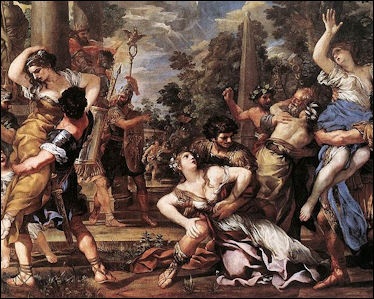
Rape of the Sabine Women
Heather Ramsey of Listverse wrote: “Titus Livius (also known as “Livy“), one of the great historians of Rome, recorded events in moral terms of the individual to reveal character, supposedly without political influence. According to the Livy’s account, Rome was founded by twins Romulus and Remus in 753 B.C. After a dispute, Romulus killed Remus and became ruler of Rome, which was named for him. To make the town grow, Romulus took in fugitives and outcasts from other areas, but they were mostly men. Rome became powerful enough to prevail in battles with violent neighbors. However, without enough women to produce children, Rome’s growth and power was expected to end in one generation. [Source: Heather Ramsey, Listverse, March 4, 2015]
“Romulus sent representatives to neighboring communities to ask for young women to marry the men of Rome. But these emissaries were turned down, sometimes in an insulting manner. This didn’t sit well with his men, so Romulus devised a crafty way to get the women he needed. He invited his neighbors to a grand celebration of Consualia, with games and sacrifices to honor the god Consus (also known as Neptunus Equestris).
“Many of Rome’s neighbors attended, including the Sabines, who brought their wives and children. All were impressed by Rome’s growth. During the festival, Romulus gave his men a prearranged signal to abduct the maidens. The Sabine parents escaped without harm but were obviously distraught by what had happened. Meanwhile, Romulus visited each abducted woman to let her know that she would have the full status, rights, and material reward of a Roman wife and that her husband would treat her well from then on.
“About a year later, the Romans and the Sabines went to war over the women. But the Sabine women were now content to remain Roman wives, so they interceded between the two sides in the midst of battle and brought about peace. After a treaty was signed, the two sides united under Roman rule, making Rome even stronger.However, Livy’s historical accounts are mixed with legend, especially in the early days of Rome, which makes it difficult to know how much of his writings are true.”
Plutarch’s Account of Rape of the Sabine Women
Plutarch wrote in the “Life of Romulus”: “In the fourth month, after the city was built, as Fabius writes, the adventure of stealing the women was attempted and some say Romulus himself, being naturally a martial man, and predisposed too, perhaps by certain oracles, to believe the fates had ordained the future growth and greatness of Rome should depend upon the benefit of war, upon these accounts first offered violence to the Sabines, since he took away only thirty virgins, more to give an occasion of war than out of any want of women. But this is not very probable; it would seem rather that, observing his city to be filled by a confluence of foreigners, a few of whom had wives, and that the multitude in general, consisting of a mixture of mean and obscure men, fell under contempt, and seemed to be of no long continuance together, and hoping farther, after the women were appeased, to make this injury in some measure an occasion of confederacy and mutual commerce with the Sabines, he took in hand this exploit after this manner. [Source: Plutarch. “Lives”, written A.D. 75, translated by John Dryden]
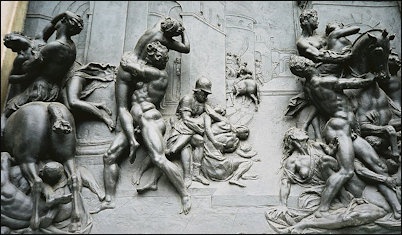
“First, he gave it out as if he had found an altar of a certain god hid under ground; the god they called Consus, either the god of counsel (for they still call a consultation consilium, and their chief magistrates consules, namely, counsellors), or else the equestrian Neptune, for the altar is kept covered in the Circus Maximus at all other times, and only at horse-races is exposed to public view; others merely say that this god had his altar hid under ground because counsel ought to be secret and concealed. Upon discovery of this altar, Romulus, by proclamation, appointed a day for a splendid sacrifice, and for public games and shows, to entertain all sorts of people: many flocked thither, and he himself sat in front, amidst his nobles clad in purple. Now the signal for their falling on was to be whenever he rose and gathered up his robe and threw it over his body; his men stood all ready armed, with their eyes intent upon him, and when the sign was given, drawing their swords and falling on with a great shout they ravished away the daughters of the Sabines, they themselves flying without any let or hindrance.
“They say there were but thirty taken, and from them the Curiae or Fraternities were named; but Valerius Antias says five hundred and twenty-seven, Juba, six hundred and eighty-three virgins: which was indeed the greatest excuse Romulus could allege, namely, that they had taken no married woman, save one only, Hersilia by name, and her too unknowingly; which showed that they did not commit this rape wantonly, but with a design purely of forming alliance with their neighbours by the greatest and surest bonds. This Hersilia some say Hostilius married, a most eminent man among the Romans; others, Romulus himself, and that she bore two children to him,- a daughter, by reason of primogeniture called Prima, and one only son, whom, from the great concourse of citizens to him at that time, he called Aollius, but after ages Abillius. But Zenodotus the Troezenian, in giving this account, is contradicted by many.
“Among those who committed this rape upon the virgins, there were, they say, as it so then happened, some of the meaner sort of men, who were carrying off a damsel, excelling all in beauty and comeliness and stature, whom when some of superior rank that met them, attempted to take away, they cried out they were carrying her to Talasius, a young man, indeed, but brave and worthy; hearing that, they commended and applauded them loudly, and also some, turning back, accompanied them with good-will and pleasure, shouting out the name of Talasus. Hence the Romans to this very time, at their weddings, sing Talasius for their nuptial word, as the Greeks do Hymenaeus, because they say Talasius was very happy in his marriage. But Sextius Sylla the Carthaginian, a man wanting neither learning nor ingenuity, told me Romulus gave this word as a sign when to begin the onset; everybody, therefore, who made prize of a maiden, cried out, Talasius; and for that reason the custom continues so now at marriages. But most are of opinion (of whom Juba particularly is one) that this word was used to new-married women by way of incitement to good housewifery and talasia (spinning), as we say in Greek, Greek words at that time not being as yet overpowered by Italian. But if this be the case, and if the Romans did at the time use the word talasia as we do, a man might fancy a more probable reason of the custom. For when the Sabines, after the war against the Romans were reconciled, conditions were made concerning their women, that they should be obliged to do no other servile offices to their husbands but what concerned spinning; it was customary, therefore, ever after, at weddings, for those that gave the bride or escorted her or otherwise were present, sportingly to say Talasius, intimating that she was henceforth to serve in spinning and no more. It continues also a custom at this very day for the bride not of herself to pass her husband's threshold, but to be lifted over, in memory that the Sabine virgins were carried in by violence, and did not go in of their own will. Some say, too, the custom of parting the bride's hair with the head of a spear was in token their marriages began at first by war and acts of hostility. This rape was committed on the eighteenth day of the month Sextilis, now called August, on which the solemnities of the Consualia are kept.”
Vestal Virgins
The six Vestal Virgins tended shrine for the household goddess Vesta at the Vesta Temple in Rome and watched the eternal flame of Rome there, which burned for more than a thousand years, were ordained at the age of seven and lived in pampered but secluded luxury. As long as they remained pure, they were among the most respected women in Rome. They could walk unaccompanied and had the power to pardon prisoners. If they lost they virginity, however they were buried alive with a burning candle and bread so they could stay alive long enough to contemplate their sins. Under Augustus they were rewarded with the best seats at gladiator contests, exclusive parties and feasts with sow's bladder and thrushes.
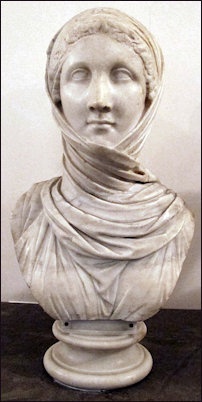
Vestal virgin
The Upper Forum in Rome (Colosseum-side entrance of the Forum) contains the House of Vestal Virgins, The Temple of Vesta the Temple of Antonius and Fustina (near the Basilica of Maxentius. The House of Vestal Virgins (near Palantine Hill, next to the Temple of Castor and Pollex) is a sprawling 55-room complex with statues of virgin priestess. The statue whose name has been scratched is believed to belong to a virgin who converted to Christianity. The Temple of Vesta (Temple of the Vestal Virgins) is a restored circular buildings where vestal virgins performed rituals and tended Rome's eternal flame for more than a thousand years. Across the square from the temple is the Regia, where Rome's highest priest had his office.
Harold Whetstone Johnston wrote in ““One of the oldest and most famous colleges was that of Vesta, whose worship was in care of the six Virgines Vestales. The sacred fire upon the altar of the Aedes Vestae symbolized the continuity of the life of the State. There was no statue of the goddess in the temple. The temple itself was round and had a pointed roof, and even in its latest development of marble and bronze had not gone far in shape and size from the round hut of poles and clay and thatch in which village girls had tended the fire whose maintenance was necessary for the primitive community. To light a fire then had been a toilsome business of rubbing wood on wood, or later striking flint on steel to get the precious spark. But the modern invention of flint and steel was never used to rekindle the sacred fire. Ritual demanded the use of friction. [Source: “The Private Life of the Romans” by Harold Whetstone Johnston, Revised by Mary Johnston, Scott, Foresman and Company (1903, 1932) forumromanum.org |+|]
“Each Vestal must serve thirty years. Any vacancy in the Order must be filled promptly by the appointment of a girl of suitable family, not less than six years old nor more than ten, physically perfect, of unblemished character, and with both parents living. Ten years were spent by the Vestals in learning their duties, ten in performing those duties, and ten in training the younger Vestals. In addition to the care of the fire the Vestals had a part in most of the festivals of the old calendar. They lived in the Atrium Vestae beside the temple of Vesta in the Forum. At the end of her service a Vesta; might return to private life, but such were the privileges and the dignity of the Order that this rarely occurred. A Vestal was freed from her father’s potestas.” |+|
Plutarch on the Vestal Virgins
Plutarch wrote in “Life of Numa,” xi-xiv: The chief priest “was also guardian of the vestal virgins, the institution of whom, and of their perpetual fire, was attributed to Numa, who, perhaps, fancied the charge of pure and uncorrupted flames would be fitly entrusted to chaste and unpolluted persons, or that fire, which consumes but produces nothing, bears an analogy to the virgin estate. Some are of opinion that these vestals had no other business than the preservation of this fire; but others conceive that they were keepers of other divine secrets, concealed from all but themselves. Gegania and Verenia, it is recorded, were the names of the first two virgins consecrated and ordained by Numa; Canuleia and Tarpeia succeeded; Servius Tullius afterwards added two, and the number of four has been continued to the present time. [Source: Plutarch (A.D. 45-127) “Lives”, written A.D. 75, translated by John Dryden]
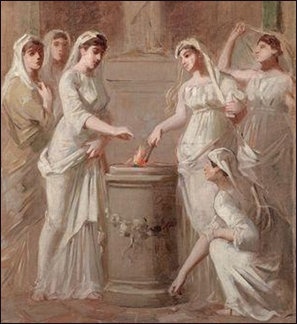
“The statutes prescribed by Numa for the vestals were these: that they should take a vow of virginity for the space of thirty years, the first ten of which they were to spend in learning their duties, the second ten in performing them, and the remaining ten in teaching and instructing others. Thus the whole term being completed, it was lawful for them to marry, and leaving the sacred order, to choose any condition of life that pleased them. But, of this permission, few, as they say, made use; and in cases where they did so, it was observed that their change was not a happy one, but accompanied ever after with regret and melancholy; so that the greater number, from religious fears and scruples forbore, and continued to old age and death in the strict observance of a single life.
“For this condition he compensated by great privileges and prerogatives; as that they had power to make a will in the lifetime of their father; that they had a free administration of their own affairs without guardian or tutor, which was the privilege of women who were the mothers of three children; when they go abroad, they have the fasces carried before them; and if in their walks they chance to meet a criminal on his way to execution, it saves his life, upon oath being made that the meeting was accidental, and not concerted or of set purpose. Any one who presses upon the chair on which they are carried is put to death.
“If these vestals commit any minor fault, they are punishable by the Pontifex Maximus only, who scourges the offender, sometimes with her clothes off, in a dark place, with a curtain drawn between; but she that has broken her vow is buried alive near the gate called Collina, where a little mound of earth stands inside the city reaching some little distance, called in Latin agger; under it a narrow room is constructed, to which a descent is made by stairs; here they prepare a bed, and light a lamp, and leave a small quantity of victuals, such as bread, water, a pail of milk, and some oil; that so that body which had been consecrated and devoted to the most sacred service of religion might not be said to perish by such a death as famine. The culprit herself is put in a litter, which they cover over, and tie her down with cords on it, so that nothing she utters may be heard. They then take her to the forum; all people silently go out of the way as she passes, and such as follow accompany the bier with solemn and speechless sorrow; and, indeed, there is not any spectacle more appalling, nor any day observed by the city with greater appearance of gloom and sadness. When they come to the place of execution, the officers loose the cords, and then the Pontifex Maximus, lifting his hands to heaven, pronounces certain prayers to himself before the act; then he brings out the prisoner, being still covered, and placing her upon the steps that lead down to the cell, turns away his face with the rest of the priests; the stairs are drawn up after she has gone down, and a quantity of earth is heaped up over the entrance to the cell, so as to prevent it from being distinguished from the rest of the mound. This is the punishment of those who break their vow of virginity.”
Cybele’s Self-Castrated Priests
Magna Mater ("Great Mother") was the Roman version of Cybele, an Anatolian mother goddess that may date back to 10,0000-year-old Çatalhöyük, the world’s oldest town, and was worshiped in a popular Roman mystery cult. The Magna Mater goddess reportedly was served by self-emasculated priests known as galli who castrated themselves with a flint knife. One aspect of the cult was the use of baptism in the blood of a bull, a practice later taken over by Mithraism. How true some of the descriptions of cult activities were is a matter of debate. Famed Classic scholar Mary Beard wrote that Hugh Bowden, author of “Mystery Cults of the Ancient World,” “takes many scholars to task (myself included) for assuming that the cult of the Great Mother in Rome, based on the Palatine Hill, just next to the Roman imperial palace, was served by ecstatic eunuch priests who castrated themselves with a piece of flint. Some of us had already been a little more circumspect about this than Bowden allows: you only have to read accounts of pre-modern full castration (for the Great Mother was supposed to demand the removal of both penis and testicles) to recognize that few priests could have survived any such procedure. But he shows that, feasible or not, the practice is anyway much less clearly attested in Roman literature than we like to think.”
Describing a festival Catullus (c.84-c.54 B.C.) wrote in Carmina 63: “Over the vast main borne by swift-sailing ship, Attis, as with hasty hurried foot he reached the Phrygian wood and gained the tree-girt gloomy sanctuary of the Goddess, there roused by rabid rage and mind astray, with sharp-edged flint downwards dashed his burden of virility. Then as he felt his limbs were left without their manhood, and the fresh-spilt blood staining the soil, with bloodless hand she hastily took a tambour light to hold, your taborine, Cybele, your initiate rite, and with feeble fingers beating the hollowed bullock's back, she rose up quivering thus to chant to her companions. [Source: Catullus, “The Carmina of Gaius Valerius Catullus,” translated by. Leonard C. Smithers. London. Smithers. 1894.
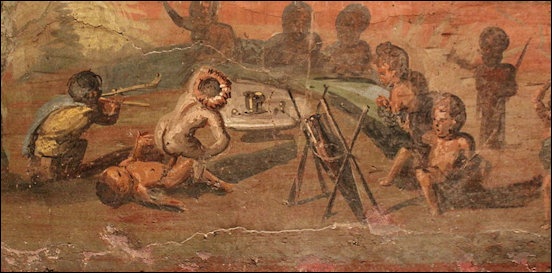
pygmy orgy
““Haste you together, she-priests, to Cybele's dense woods, together haste, you vagrant herd of the dame Dindymene, you who inclining towards strange places as exiles, following in my footsteps, led by me, comrades, you who have faced the ravening sea and truculent main, and have castrated your bodies in your utmost hate of Venus, make glad our mistress speedily with your minds' mad wanderings. Let dull delay depart from your thoughts, together haste you, follow to the Phrygian home of Cybele, to the Phrygian woods of the Goddess, where sounds the cymbal's voice, where the tambour resounds, where the Phrygian flutist pipes deep notes on the curved reed, where the ivy-clad Maenades furiously toss their heads, where they enact their sacred orgies with shrill-sounding ululations, where that wandering band of the Goddess flits about: there it is meet to hasten with hurried mystic dance.”
“When Attis, spurious woman, had thus chanted to her comity, the chorus straightway shrills with trembling tongues, the light tambour booms, the concave cymbals clang, and the troop swiftly hastes with rapid feet to verdurous Ida. Then raging wildly, breathless, wandering, with brain distraught, hurries Attis with her tambour, their leader through dense woods, like an untamed heifer shunning the burden of the yoke: and the swift Gallae press behind their speedy-footed leader. So when the home of Cybele they reach, wearied out with excess of toil and lack of food they fall in slumber. Sluggish sleep shrouds their eyes drooping with faintness, and raging fury leaves their minds to quiet ease.
“But when the sun with radiant eyes from face of gold glanced over the white heavens, the firm soil, and the savage sea, and drove away the glooms of night with his brisk and clamorous team, then sleep fast-flying quickly sped away from wakening Attis, and goddess Pasithea received Somnus in her panting bosom. Then when from quiet rest torn, her delirium over, Attis at once recalled to mind her deed, and with lucid thought saw what she had lost, and where she stood, with heaving heart she backwards traced her steps to the landing-place. There, gazing over the vast main with tear-filled eyes, with saddened voice in tristful soliloquy thus did she lament her land:
““Mother-land, my creatress, mother-land, my begetter, which full sadly I'm forsaking, as runaway serfs do from their lords, to the woods of Ida I have hasted on foot, to stay amid snow and icy dens of beasts, and to wander through their hidden lurking-places full of fury. Where, or in what part, mother-land, may I imagine that you are? My very eyeball craves to fix its glance towards you, while for a brief space my mind is freed from wild ravings. And must I wander over these woods far from my home? From country, goods, friends, and parents, must I be parted? Leave the forum, the palaestra, the race-course, and gymnasium? Wretched, wretched soul, it is yours to grieve for ever and ever. For what shape is there, whose kind I have not worn? I (now a woman), I a man, a stripling, and a lad; I was the gymnasium's flower, I was the pride of the oiled wrestlers: my gates, my friendly threshold, were crowded, my home was decked with floral garlands, when I used to leave my couch at sunrise. Now will I live a ministrant of gods and slave to Cybele? I a Maenad, I a part of me, I a sterile trunk! Must I range over the snow-clad spots of verdurous Ida, and wear out my life beneath lofty Phrygian peaks, where stay the sylvan-seeking stag and woodland-wandering boar? Now, now, I grieve the deed I've done; now, now, do I repent!”
“As the swift sound left those rosy lips, borne by new messenger to gods' twinned ears, Cybele, unloosing her lions from their joined yoke, and goading, the left-hand foe of the herd, thus speaks: “Come,” she says, “to work, you fierce one, cause a madness urge him on, let a fury prick him onwards till he returns through our woods, he who over-rashly seeks to fly from my empire. On! thrash your flanks with your tail, endure your strokes; make the whole place re-echo with roar of your bellowings; wildly toss your tawny mane about your nervous neck.” Thus ireful Cybele spoke and loosed the yoke with her hand. The monster, self-exciting, to rapid wrath spurs his heart, he rushes, he roars, he bursts through the brake with heedless tread. But when he gained the humid verge of the foam-flecked shore, and spied the womanish Attis near the opal sea, he made a bound: the witless wretch fled into the wild wood: there throughout the space of her whole life a bondsmaid did she stay. Great Goddess, Goddess Cybele, Goddess Dame of Dindymus, far from my home may all your anger be, 0 mistress: urge others to such actions, to madness others hound.”
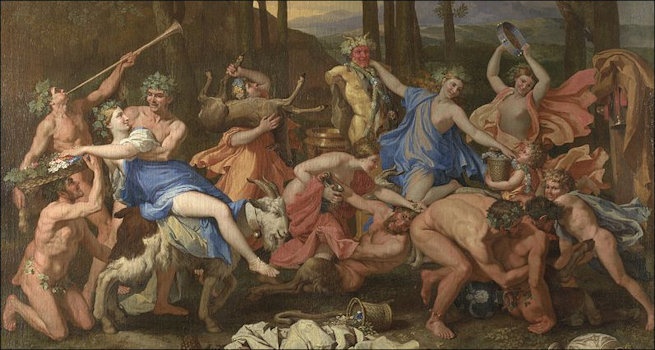
Bacchanal by Nicolas Poussin
Wild Dionysus Festivals
Wild festivals honoring Dionysus (Bacchus), the god of wine and good times, were very much alive in the Roman Empire as they were in ancient Greece. To pay their respect to Dionysus, members of Dionysus cult, held a winter-time festival in which a large phallus was erected and displayed. After competitions were held to see who could empty their jug of wine the quickest, a procession from the sea to the city was held with flute players, garland bearers and honored citizens dressed as satyrs and maenads (nymphs), which were often paired together. At the end of the procession a bull was sacrificed symbolizing the fertility god's marriage to the queen of the city. [Source: "The Creators" by Daniel Boorstin,"]
The word “maenad” is derived from the same root that gave us the words “manic” and “madness”. Maenads were subjects of numerous vase paintings. Like Dionysus himself they often depicted with a crown of ivy and fawn skins draped over one shoulder. To express the speed and wildness of their movement the figures in the vase images had flying tresses and cocked back head. Their limbs were often in awkward positions, suggesting drunkenness.
The main purveyors of the Dionysus fertility cult "These drunken devotees of Dionysus," wrote Boorstin, "filled with their god, felt no pain or fatigue, for they possessed the powers of the god himself. And they enjoyed one another to the rhythm of drum and pipe. At the climax of their mad dances the maenads, with their bare hands would tear apart some little animal that they had nourished at their breast. Then, as Euripides observed, they would enjoy 'the banquet of raw flesh.' On some occasions, it was said, they tore apart a tender child as if it were a fawn'"μ
One time the maenads got so involved in what they were doing they had to be rescued from a snow storm in which they were found dancing in clothes frozen solid. On another occasion a government official that forbade the worship of Dionysus was bewitched into dressing up like a maenad and enticed into one of their orgies. When the maenads discovered him, he was torn to pieces until only a severed head remained."
It is not totally clear whether the maenad dances were based purely on mythology and were acted out by festival goers or whether there were really episodes of mass hysteria, triggered perhaps by disease and pent up frustration by women living in a male'dominate society. On at least one occasion these dances were banned and an effort was made to chancel the energy into something else such as poetry reading contests.
Livy’s Account of Dionysiac Frenzy in Italy
Describing the Senatusconsultum de Bacchanalibus in Italy, Livy wrote in “History of Rome”, Book 39. 8-19 (186 B.C.): "During the following year, the consuls Spurius Postumius Albinus and Quintus Marcius Philippus were diverted from the army and the administration of wars and provinces to the suppression of an internal conspiracy.... A lowborn Greek came first into Etruria [Tuscany], a man who was possessed of none of the numerous arts which [the Greeks] have introduced among us for the cultivation of mind and body. He was a mere sacrificer and a fortuneteller–not even one of those who imbue men’s minds with error by preaching their creed in public and professing their business openly; instead he was a hierophant of secret nocturnal rites. At first these were divulged to only a few. Then they began to spread widely among men, and women. To the religious content were added the pleasures of wine and feasting–to attract a greater number. [Source: (Livy History of Rome Book 39. 8-19: 186 B.C., John Adams, California State University, Northridge (CSUN), “Classics 315: Greek and Roman Mythology class]
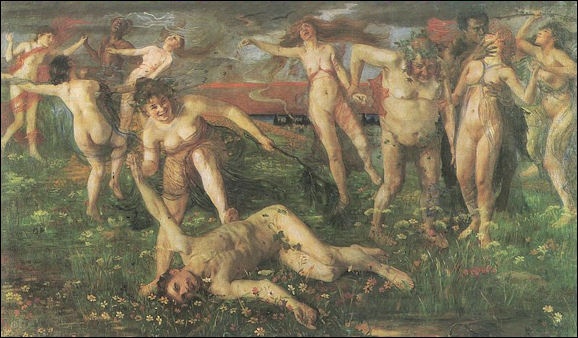
“When they were heated with wine and all sense of modesty had been extinguished by the darkness of night and the commingling of males with females, tender youths with elders, then debaucheries of every kind commenced. Each had pleasures at hand to satisfy the lust to which he was most inclined. Nor was the vice confined to the promiscuous intercourse of free men and women! False witnesses and evidence, forged seals and wills, all issued from this same workshop. Also, poisonings and murders of kin, so that sometimes the bodies could not even be found for burial. Much was ventured by guile, more by violence, which was kept secret, because the cries of those calling for help amid the debauchery and murder could not be heard through the howling and the crash of drums and cymbals.
“This pestilential evil spread from Etruria [Tuscany] to Rome like a contagious disease. At first, the size of the city, with room and tolerance for such evils, concealed it. But information at length reached the Consul Postumus.... Postumus laid the matter before the Senate, setting forth everything in detail-first the information he had received; and then, the results of his own investigations. The Senators were seized by a panic of fear, both for the public safety (lest these secret conspiracies and nocturnal gatherings contain some hidden harm or danger) and for themselves individually (lest some relatives be involved in this vice). They decreed a vote of thanks to the Consul for having investigated the matter so diligently and without creating any public disturbance. Then they commissioned the consuls to conduct a special inquiry into the Bacchanalia and nocturnal rites. They directed them to see to it that Aebutius and Faecenia suffer no harm for the evidence they had given, and to offer rewards to induce other informers to come forward; the priests of these rites, whether men or women, were to be sought out not only in Rome but in every forum and conciliabulum, so that they might ‘be at the disposal of’ the consuls. Edicts were to be published in the City of Rome and throughout Italy, ordering that none who had been initiated into the Bacchic rites should be minded to gather or come together for the celebration of these rites, or to perform any such ritual. And above all, an inquiry was to be conducted regarding those persons who had gathered together or conspired to promote debauchery or crime.
“These were the measures decreed by the Senate. The consuls ordered the Curule Aediles to search out all the priests of this cult, apprehend them, and keep them under house arrest for the inquiry; the Plebeian Aediles were to see that no rites were performed in secret. The Three Commissioners (Tresviri Capitales) were instructed to post watches throughout the City, to see to it that no nocturnal gatherings took place and to take precautions against fires. And to assist them, five men were assigned on each side of the Tiber, each to take responsibility for the buildings in his own district....
“The Consuls then ordered the Decrees of the Senate to be read [in the Assembly] and they announced a reward to be paid to anyone who brought a person before them, or, in the absence of the person, reported his name. If anyone took flight after being named, the Consuls would fix a day for him to answer the charge, and on that day, if he failed to answer when called, he would be condemned in absentia. If any person were named who was beyond the confines of Italy at the time, they would set a more flexible date, in the event that he should wish to come to Rome and plead his case. Next, they ordered by edict that no person be minded to sell or buy anything for the purpose of flight; that no one harbor, conceal, or in any way assist fugitives.... Guards were posted at the gates, and during the night following the disclosure of the affair in the Assembly, many who tried to escape were arrested by the Tresviri Capitales and brought back. Many names were reported, and some of these, women as well as men, committed suicide. It was said that more than 7,000 men and women were implicated in the conspiracy.”
“Next the Consuls were given the task of destroying all places of Bacchic worship, first at Rome, and then throughout the length and bradth of Italy–except where there was an ancient altar or a sacred image. For the future, the Senate decreed that there should be NO Bacchic rites in Rome or in Italy. If any person considered such worship a necessary observance, that he could not neglect without fear of committing sacrilege, then he was to make a declaration before the Praetor Urbanus, and the Praetor would consult the Senate. IF permission were granted by the Senate (with at least one hundred senators present), he might perform that rite–provided that no more than five persons took part in the ritual, and that they had no common fund and no master or priest...."”
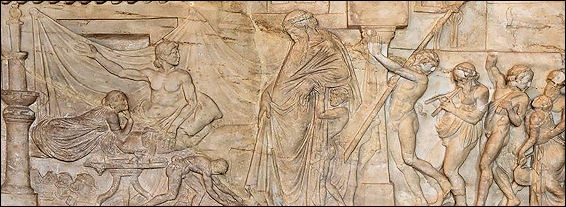
Dionysius in the Bacchae by Euripides
Euripides wrote in “The Bacchae,” 677-775: The Messenger said: “The herds of grazing cattle were just climbing up the hill, at the time when the sun sends forth its rays, warming the earth. I saw three companies of dancing women, one of which Autonoe led, the second your mother Agave, and the third Ino. All were asleep, their bodies relaxed, some resting their backs against pine foliage, others laying their heads at random on the oak leaves, modestly, not as you say drunk with the goblet and the sound of the flute, hunting out Aphrodite through the woods in solitude. [Source: Euripides. “The Tragedies of Euripides,” translated by T. A. Buckley. Bacchae. London. Henry G. Bohn. 1850.
“Your mother raised a cry, standing up in the midst of the Bacchae, to wake their bodies from sleep, when she heard the lowing of the horned cattle. And they, casting off refreshing sleep from their eyes, sprang upright, a marvel of orderliness to behold, old, young, and still unmarried virgins. First they let their hair loose over their shoulders, and secured their fawn-skins, as many of them as had released the fastenings of their knots, girding the dappled hides with serpents licking their jaws. And some, holding in their arms a gazelle or wild wolf-pup, gave them white milk, as many as had abandoned their new-born infants and had their breasts still swollen. They put on garlands of ivy, and oak, and flowering yew. One took her thyrsos and struck it against a rock, from which a dewy stream of water sprang forth. Another let her thyrsos strike the ground, and there the god sent forth a fountain of wine. All who desired the white drink scratched the earth with the tips of their fingers and obtained streams of milk; and a sweet flow of honey dripped from their ivy thyrsoi; so that, had you been present and seen this, you would have approached with prayers the god whom you now blame.
“We herdsmen and shepherds gathered in order to debate with one another concerning what strange and amazing things they were doing. Some one, a wanderer about the city and practised in speaking, said to us all: “You who inhabit the holy plains of the mountains, do you wish to hunt Pentheus' mother Agave out from the Bacchic revelry and do the king a favor?” We thought he spoke well, and lay down in ambush, hiding ourselves in the foliage of bushes. They, at the appointed hour, began to wave the thyrsos in their revelries, calling on Iacchus, the son of Zeus, Bromius, with united voice. The whole mountain revelled along with them and the beasts, and nothing was unmoved by their running.
“Agave happened to be leaping near me, and I sprang forth, wanting to snatch her, abandoning the ambush where I had hidden myself. But she cried out: “O my fleet hounds, we are hunted by these men; but follow me! follow armed with your thyrsoi in your hands!” We fled and escaped from being torn apart by the Bacchae, but they, with unarmed hands, sprang on the heifers browsing the grass. and you might see one rending asunder a fatted lowing calf, while others tore apart cows. You might see ribs or cloven hooves tossed here and there; caught in the trees they dripped, dabbled in gore. Bulls who before were fierce, and showed their fury with their horns, stumbled to the ground, dragged down by countless young hands. The garment of flesh was torn apart faster then you could blink your royal eyes. And like birds raised in their course, they proceeded along the level plains, which by the streams of the Asopus produce the bountiful Theban crop. And falling like soldiers upon Hysiae and Erythrae, towns situated below the rock of Kithairon, they turned everything upside down. They were snatching children from their homes; and whatever they put on their shoulders, whether bronze or iron, was not held on by bonds, nor did it fall to the ground. They carried fire on their locks, but it did not burn them. Some people in rage took up arms, being plundered by the Bacchae, and the sight of this was terrible to behold, lord. For their pointed spears drew no blood, but the women, hurling the thyrsoi from their hands, kept wounding them and turned them to flight—women did this to men, not without the help of some god. And they returned where they had come from, to the very fountains which the god had sent forth for them, and washed off the blood, and snakes cleaned the drops from the women's cheeks with their tongues.
“Receive this god then, whoever he is, into this city, master. For he is great in other respects, and they say this too of him, as I hear, that he gives to mortals the vine that puts an end to grief. Without wine there is no longer Aphrodite or any other pleasant thing for men. I fear to speak freely to the king, but I will speak nevertheless: Dionysus is inferior to none of the gods.”
Pentheus said: “Already like fire does this insolence of the Bacchae blaze up, a great reproach for the Hellenes. But we must not hesitate. Go to the Electran gates, bid all the shield-bearers and riders of swift-footed horses to assemble, as well as all who brandish the light shield and pluck bowstrings with their hands, so that we can make an assault against the Bacchae. For it is indeed too much if we suffer what we are suffering at the hands of women.”
Dionysus said: “Pentheus, though you hear my words, you obey not at all. Though I suffer ill at your hands, still I say that it is not right for you to raise arms against a god, but to remain calm. Bromius will not allow you to remove the Bacchae from the joyful mountains.”
Debauched Roman Emperors and Their Families
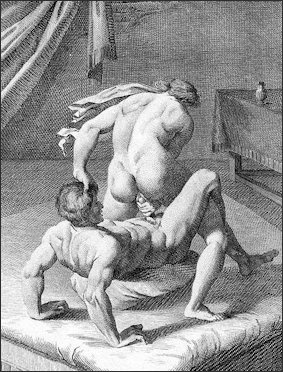
Julia, the daughter of Augustus, and an athlete
Caligula had four wives, and raped one of his sisters and forced her to marry his male lover, Marcus Lapidus. He also made prostitutes out of his other sisters and made love to his friend's wives. After having sex with someone's wife he prohibited them from every having intercourse with their husbands again :then publicly issued divorce proceedings in their husband's name. Among the sweet nothings he whispered into the ears of his lovers was "Off comes this head whenever I give the word."
Outdoing even Caligula in terms of decadence was Empress Valeria Messalina, the wife of Claudius I. While her emperor husband was leading military campaigns across Europe to shore up the empire she was having scandalous affairs with palace courtiers, entertainers and soldiers. When a handsome actor refused to leave the stage to be her full-time lover the empress got her husband to order the actor to leave. After threes years of lovemaking the actor was covered with scars for which the empress rewarded him with statue of his attributes. [People's Almanac]
During one drunken escapade Messalina danced naked on top of a wooden platform at the forum. On another occasion she gilded her nipples, decorated her bedroom in the palace like a brothel, and invited all comers. And, on yet another occasion she challenged Rome's leading prostitute to a contest, which the empress won by "cohabiting 25 times...within the space of 24 hours." Later she slept with men with large real estate holding and condemned them to death afterwards so she could claim their property. Finally Claudius had enough — when she married another man in a public ceremony in which the newlyweds entertained the guest with some bedroom acrobatics — and ordered her killed. [People's Almanac]
Nero was also quite extreme. In his book Nero , Edward Champlin wrote: “Nero murdered his mother, and Nero fiddled while Rome burned. Nero also slept with his mother, Nero married and executed one stepsister, executed his other stepsister, raped and murdered his stepbrother. In fact, he executed or murdered most of his close relatives. He kicked his pregnant wife to death. He castrated and then married a freedman. He married another freedman, this time himself playing the bride. He raped a vestal virgin. He melted down the household gods of Rome for their cash value."
The youthful Elagabulus (ruled A.D. 218-222) started dressing in drag shortly after he was named emperor. He enjoyed pretending he was a woman so much that he ordered the senate to address him as the "Empress of Rome." He once ordered 600 ostriches killed so his cooks could make him ostrich-brain pies. He made appointments by choosing men with the largest penises.
Tiberius reformed the execution of virgins. He decreed that condemned virgins should be deflowered by their executioners before their sentence was carried out.
Tiberius Indulges in Strange Sex and Weird Games
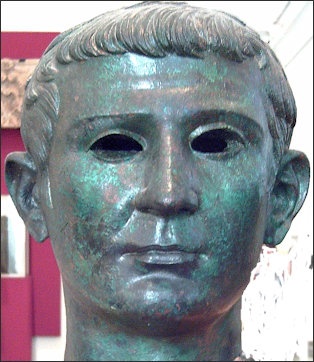
Tiberius
Tiberius (14–37 A.D.) was the son of and Emperor after Augustus. Suetonius wrote: “Having gained the licence of privacy, and being as it were out of sight of the citizens, he at last gave free rein at once to all the vices which he had for a long time ill concealed; and of these I shall give a detailed account from the beginning. Even at the outset of his military career his excessive love of wine gave him the name of Biberius, instead of Tiberius, Caldius for Claudius, and Mero for Nero. Later, when emperor and at the very time that he was busy correcting the public morals, he spent a night and two whole days feasting and drinking with Pomponius Flaccus and Lucius Piso, immediately afterward making the one governor of the province of Syria and the other prefect of the city, and even declaring in their commissions that they were the most agreeable of friends, who could always be counted on. [Source: Suetonius (c.69-after 122 A.D.) Tiberius, “De Vita Caesarum,” written A.D. 110, 2 Vols., translated by J. C. Rolfe (Cambridge, Mass.: Harvard University Press, 1920), pp. 291-401]
“He had a dinner given him by Cestius Gallus, a lustful and prodigal old man, who had once been degraded by Augustus and whom he had himself rebuked a few days before in the Senate, making the condition that Cestius should change or omit none of his usual customs, and that nude girls should wait upon them at table. He gave a very obscure candidate for the quaestorship preference over men of the noblest families, because at the emperor's challenge he had drained an amphora of wine at a banquet. He paid Asellius Sabinus two hundred thousand sesterces for a dialogue, in which he had introduced a contest of a mushroom, a fig-pecker, an oyster and a thrush. Finally he established a new office, master of the imperial pleasures, assigning it to Titus Caesonius Priscus, a Roman knight.
“After retiring to Capri, where he had a private pleasure palace built, many young men and women trained in sexual practices were brought there for his pleasure, and would have sex in groups in front of him. Some rooms were furnished with pornography and sex manuals from Egypt - which let the people there know what was expected of them. Tiberius also created lechery nooks in the woods and had girls and boys dressed as nymphs and Pans prostitute themselves in the open. The place was known popularly as "goat-pri".]
“Some of the things he did are hard to believe. He had little boys trained as minnows to chase him when he went swimming and to get between his legs and nibble him. He also had babies not weaned from their mother breast suck at his chest and groin. There was a painting left to him, with the provision that if he did not like it he could have 10,000 gold pieces, and Tiberius kept the picture. It showed Atalanta sucking off Meleager. Once in a frenzy, while sacrificing he was attracted to the acolyte and could not wait to hurry the acolyte and his brother out of the temple and assault them. When they protested, he had their legs broken.
“How grossly he was in the habit of abusing women even of high birth is very clearly shown by the death of a certain Mallonia. When she was brought to his bed and refused most vigorously to submit to his lust, he turned her over to the informers, and even when she was on trial he did not cease to call out and ask her "whether she was sorry"; so that finally she left the court and went home, where she stabbed herself, openly upbraiding the ugly old man for his obscenity. Hence a stigma put upon him at the next plays in an Atellan farce was received with great applause and became current, that "the old goat was licking the does."
Caligula's Sex Life
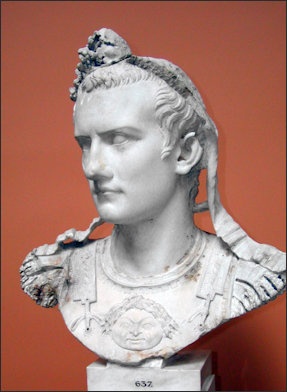
Caligula
Gaius Germanicus (Caligula) (37–41 A.D.) succeeded Tiberius. Caligula had four wives and demanded sex with many women including his three sisters. He raped one of his sisters and forced her to marry his male lover, Marcus Lapidus. He made prostitutes out of his other sisters and made love to his friend's wives. After having sex with someone's wife he prohibited them from every having intercourse with their husbands again :then publicly issued divorce proceedings in their husband's name. Among the sweet nothings he whispered into the ears of his lovers was "Off comes this head whenever I give the word." According to Pliny, Lollia Pualina, the consort of Caligula, was “covered with emeralds and pearl interlaced and alternately shining all over her head, hair, ears, neck and fingers, the sum total amounting to 40,000,000 sesterces." The annual salary of a soldier was around, 1,200 sesterces.
Suetonius wrote: “ “It is not easy to decide whether he acted more basely in contracting his marriages, in annulling them, or as a husband. At the marriage of Livia Orestilla to Gaius Piso, he attended the ceremony himself, gave orders that the bride be taken to his own house, and within a few days divorced her; two years later he banished her, because of a suspicion that in the meantime she had gone back to her former husband. Others write that being invited to the wedding banquet, he sent word to Piso, who reclined opposite to him: "Don't take liberties with my wife," and at once carried her off with him from the table, the next day issuing a proclamation that he had got himself a wife in the manner of Romulus and Augustus. When the statement was made that the grandmother of Lollia Paulina, who was married to Gaius Memmius, an ex-consul commanding armies, had once been a remarkably beautiful woman, he suddenly called Lollia from the province, separated her from her husband, and married her, then in a short time he put her away, with the command never to have intercourse with anyone. [Source: Suetonius (c.69-after 122 A.D.) “De Vita Caesarum: Caius Caligula” (“The Lives of the Caesars: Caius Caligula”) written in A.D. 110, 2 Vols., translated by J. C. Rolfe, (Cambridge, Mass.: Harvard University Press, and London: William Henemann, 1920), Vol. I, pp. 405-497, modernized by J. S. Arkenberg, Dept. of History, Cal. State Fullerton]
“Though Caesonia was neither beautiful nor young, and was already mother of three daughters by another, besides being a woman of reckless extravagance and wantonness, he loved her not only more passionately but more faithfully, often exhibiting her to the soldiers riding by his side, decked with cloak, helmet and shield, and to his friends even in a state of nudity. He did not honor her with the title of wife until she had borne him a child, announcing on the selfsame day that he had married her and that he was the father of her babe. This babe, whom he named Julia Drusilla, he carried to the temples of all the goddesses, finally placing her in the lap of Minerva and commending to her the child's nurture and training. And no evidence convinced him so positively that she was sprung from his own loins as her savage temper, which was even then so violent that she would try to scratch the faces and eyes of the little children who played with her.
“He respected neither his own chastity nor that of anyone else. He is said to have had unnatural relations with Marcus Lepidus, the pantomimic actor Mnester, and certain hostages. Valerius Catullus, a young man of a consular family, publicly proclaimed that he had violated the emperor and worn himself out in commerce with him. To say nothing of his incest with his sisters and his notorious passion for the concubine Pyrallis, there was scarcely any woman of rank whom he did not approach.
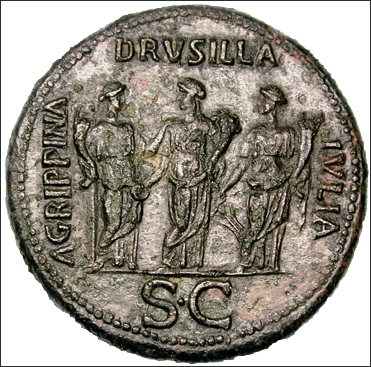
Caligula's three sisters
“These as a rule he invited to dinner with their husbands, and as they passed by the foot of his couch, he would inspect them critically and deliberately, as if buying slaves, even putting out his hand and lifting up the face of anyone who looked down in modesty; then as often as the fancy took him he would leave the room, sending for the one who pleased him best, and returning soon afterward with evident signs of what had occurred, he would openly commend or criticize his partner, recounting her charms or defects and commenting on her conduct. To some he personally sent a bill of divorce in the name of their absent husbands, and had it entered in the public records. “He added to the enormity of his crimes by the brutality of his language. He used to say that there was nothing in his own character which he admired and approved more highly than what he called his "lasting power", that is, his shameless impudence [a sexual innuendo]. When his grandmother Antonia gave him some advice, he was not satisfied merely not to listen but replied: "Remember that I have the right to do anything to anybody."
Caligula's Sex Life with His Sisters
Suetonius wrote: “He lived in habitual incest with all his sisters, and at a large banquet he placed each of them in turn below him, while his wife reclined above. Of these he is believed to have violated Drusilla when he was still a minor, and even to have been caught lying with her by his grandmother Antonia, at whose house they were brought up in company. Afterwards, when she was the wife of Lucius Cassius Longinus, an ex-consul, he took her from him and openly treated her as his lawful wife; and when ill, he made her heir to his property and the throne. When she died, he appointed a season of public mourning, during which it was a capital offence to laugh, bathe, or dine in company with one's parents, wife, or children. [Source: Suetonius (c.69-after 122 A.D.) “De Vita Caesarum: Caius Caligula” (“The Lives of the Caesars: Caius Caligula”) written in A.D. 110, 2 Vols., translated by J. C. Rolfe, (Cambridge, Mass.: Harvard University Press, and London: William Henemann, 1920), Vol. I, pp. 405-497, modernized by J. S. Arkenberg, Dept. of History, Cal. State Fullerton]
“He was so beside himself with grief that suddenly fleeing the city by night and traversing Campania, he went to Syracuse and hurriedly returned from there without cutting his hair or shaving his beard. And he never afterwards took oath about matters of the highest moment, even before the assembly of the people or in the presence of the soldiers, except by the godhead of Drusilla. The rest of his sisters he did not love with so great affection, nor honor so highly, but often prostituted them to his favorites; so that he was the readier at the trial of Aemilius Lepidus to condemn them, as adulteresses and privy to the conspiracies against him; and he not only made public letters in the handwriting of all of them, procured by fraud and seduction, but also dedicated to Mars the Avenger, with an explanatory inscription, three swords designed to take his life.”
Claudius's Wife Messalina
Claudius I (41–54 A.D.) followed Caligula as Emperor. Outdoing even Caligula in terms of decadence was Empress Valeria Messalina, the wife of Claudius I. While her emperor husband was leading military campaigns across Europe to shore up the empire she was having scandalous affairs with palace courtiers, entertainers and soldiers. When a handsome actor refused to leave the stage to be her full-time lover the empress got her husband to order the actor to leave. After threes years of lovemaking the actor was covered with scars for which the empress rewarded him with statue of his attributes. [People's Almanac]
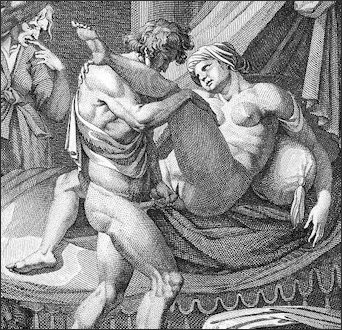
Messalina
During one drunken escapade Messalina danced naked on top of a wooden platform at the forum. On another occasion she gilded her nipples, decorated her bedroom in the palace like a brothel, and invited all comers. And, on yet another occasion she challenged Rome's leading prostitute to a contest, which the empress won by "cohabiting 25 times...within the space of 24 hours." Later she slept with men with large real estate holding and condemned them to death afterwards so she could claim their property. Finally Claudius had enough---when she married another man in a public ceremony in which the newlyweds entertained the guest with some bedroom acrobatics---and ordered her killed. [People's Almanac]
Suetonius wrote: “Among other things men have marveled at his absent-mindedness and blindness. When he had put Messalina to death, he asked shortly after taking his place at the table why the empress did not come. He caused many of those whom he had condemned to death to be summoned the very next day to consult with him or game with him, and sent a messenger to upbraid them for sleepy-heads when they delayed to appear. When he was planning his unlawful marriage with Agrippina, in every speech that he made he constantly called her his daughter and nursling, born and brought up in his arms. Just before his adoption of Nero, as if it were not bad enough to adopt a stepson when he had a grownup son of his own, he publicly declared more than once that no one had ever been taken into the Claudian family by adoption. [Source: Suetonius (c.69-after 122 A.D.) : “De Vita Caesarum:Claudius” (“The Lives of the Caesars: Claudius”), written in A.D. 110, 2 Vols., translated by J. C. Rolfe, (Cambridge, Mass.: Harvard University Press, and London: William Henemann, 1920), Vol. I, pp. 405-497, modernized by J. S. Arkenberg, Dept. of History, Cal. State Fullerton]
Nero’s Strange Sex Life
Nero (54–68 A.D.) was the notorious emperor after Claudius I. Suetonius wrote: “Besides abusing freeborn boys and seducing married women, he debauched the vestal virgin Rubria. The freedwoman Acte he all but made his lawful wife, after bribing some ex-consuls to perjure themselves by swearing that she was of royal birth. He castrated the boy Sporus and actually tried to make a woman of him; and he married him with all the usual ceremonies, including a dowry and a bridal veil, took him to his home attended by a great throng, and treated him as his wife. And the witty jest that someone made is still current, that it would have been well for the world if Nero's father Domitius had had that kind of wife. [Source: Suetonius (c.69-after 122 A.D.) : “De Vita Caesarum: Nero: ” (“The Lives of the Caesars: Nero”), written in A.D. 110, 2 Vols., translated by J. C. Rolfe, Loeb Classical Library (London: William Heinemann, and New York: The MacMillan Co., 1914), II.87-187, modernized by J. S. Arkenberg, Dept. of History, Cal. State Fullerton]
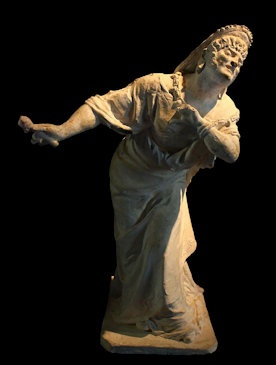
Nero dressed as a woman
“This Sporus, decked out with the finery of the empresses and riding in a litter, he took with him to the courts and marts of Greece, and later at Rome through the Street of the Images, fondly kissing him from time to time. That he even desired illicit relations with his own mother, and was kept from it by her enemies, who feared that such a relationship might give the reckless and insolent woman too great influence, was notorious, especially after he added to his concubines a courtesan who was said to look very like Agrippina. Even before that, so they say, whenever he rode in a litter with his mother, he had incestuous relations with her, which were betrayed by the stains on his clothing.
“He so prostituted his own chastity that after defiling almost every part of his body, he at last devised a kind of game, in which, covered with the skin of some wild animal, he was let loose from a cage and attacked the private parts of men and women, who were bound to stakes, and when he had sated his mad lust, was dispatched by his freedman Doryphorus; for he was even married to this man in the same way that he himself had married Sporus, going so far as to imitate the cries and lamentations of a maiden being deflowered. I have heard from some men that it was his unshaken conviction that no man was chaste or pure in any part of his body, but that most of them concealed their vices and cleverly drew a veil over them; and that therefore he pardoned all other faults in those who confessed to him their lewdness.”
Image Sources: Wikimedia Commons
Text Sources: Internet Ancient History Sourcebook: Rome sourcebooks.fordham.edu ; Internet Ancient History Sourcebook: Late Antiquity sourcebooks.fordham.edu ; Forum Romanum forumromanum.org ; “Outlines of Roman History” by William C. Morey, Ph.D., D.C.L. New York, American Book Company (1901), forumromanum.org \~\; “The Private Life of the Romans” by Harold Whetstone Johnston, Revised by Mary Johnston, Scott, Foresman and Company (1903, 1932) forumromanum.org |+|; BBC Ancient Rome bbc.co.uk/history/ ; Perseus Project - Tufts University; perseus.tufts.edu ; MIT, Online Library of Liberty, oll.libertyfund.org ; Gutenberg.org gutenberg.org Metropolitan Museum of Art, National Geographic, Smithsonian magazine, New York Times, Washington Post, Los Angeles Times, Live Science, Discover magazine, Times of London, Natural History magazine, Archaeology magazine, The New Yorker, Encyclopædia Britannica, "The Discoverers" [∞] and "The Creators" [μ]" by Daniel Boorstin. "Greek and Roman Life" by Ian Jenkins from the British Museum.Time, Newsweek, Wikipedia, Reuters, Associated Press, The Guardian, AFP, BBC, and various books and other publications.
Last updated October 2018
